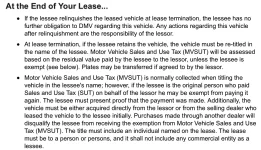The way your lease amortized down to the residual actually straight line. The total "interest" paid or your "rent" charge they call it on the lease you sign) on the life of the lease is then divided by 36 monthly payments. This is effectively the interest amount that Genesis charges you for borrowing $45,000 for 3 years at 1.1%. If you take that amount minus your payment that is how much your residual will amortize down each month as you make your monthly payments. It's one of the bizarre thing about leases, the interest is linear instead of a typical loan how the interest is higher in the early months and lower in the later months as you pay the principal down. So in theory your residual comes down faster in the early portion of the lease than it would if you were calculating a loan amortization.
Example: Lets say your cap cost is $45000(this is all in, calculated as what you pay for car plus $750 acquisition fee, plus license fees for your state, ignoring sales tax), your residual is $27,030, and your say your car MSRP is 53,000(roughly 51% residual). I am ignoring sales tax for this example(after all I'm in Oregon). your payment is 531.97 on a money factor of .00046(1.1%). Your total interest(or rent charge) on this lease is $1,181. They call it rent charge, it is interest, dont be fooled. So take $1,181/36 payments and this is $32.80 a month interest(rent charge). So after month 1 your residual is ($45,000-$531.97+$32.80), or $44,500.83. Each month your residual will go down $499.17 until you reach $27,030. Trust me, this is 100% accurate, i have leased 20+ cars and do leasing for a SEC publicly traded companies.
* might be some rounding in here but should be <$1.00











